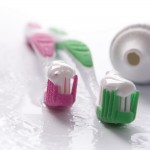
For critically ill patients receiving mechanical ventilation, ventilator-associated pneumonia (VAP) is a life threatening condition. Incidence rates varies and mortality rates can be as high as 50% . The aim of this study was to evaluate the effects brushing teeth twice daily with purified water on VAP rates and oral health or hygiene in postneurosurgical, intensive care unit patients.
Patients under ventilator support for at least 48 to 72 hours and no current pneumonia were randomised to receive a twice-daily oral care protocol of toothbrushing with purified water, elevating the head of the bed, and before-and-after hypopharyngeal suctioning( experimental Group) or twice-daily mock oral care elevating the head of the bed, moisturizing the lips, and before-and-after hypopharyngeal suctioning (control group) in addition to usual hospital care of daily oral care using cotton swabs. VAP was defined by a clinical pulmonary infection score of > 6. Oral hygiene and health was assessed after conclusion of the intervention.
The patients (N = 53) were predominantly male (64.2%) with a mean age of 60.6 years having received emergency surgery (75.5%).
After 7 days they found
- cumulative VAP rates were significantly lower in the experimental (17%) than in the control (71%; p <.05) group.
- The experimental group also had significantly better scores for oral health (p <.05) and plaque index (p <.01).
They concluded
Findings suggest that, as an inexpensive alternative to existing protocols, toothbrushing twice daily with purified water reduces VAP and improves oral health and hygiene.
Yao LY, Chang CK, Maa SH, Wang C, Chen CC. Brushing Teeth With Purified Water to Reduce Ventilator-Associated Pneumonia. J Nurs Res. 2011 Dec;19(4):289-297.PubMed PMID: 22089654.
Comment
We have previously highlighted a trail by Needleman et al which looked at the use of powered toothbrushes to reduced VAP associated pathogens. The Lancet has also recently published a systematic review
Labeau SO, Van de Vyver K, Brusselaers N, Vogelaers D, Blot SI. Prevention of ventilator-associated pneumonia with oral antiseptics: a systematic review and meta-analysis. Lancet Infect Dis. 2011 Nov;11(11):845-54. Epub 2011 Jul 26.PubMed PMID: 21798809.
The Lancet review focussed on the effect of oral care with chlorhexidine or povidone-iodine on the prevalence of ventilator-associated pneumonia versus oral care without these antiseptics in adults.
They searched PubMed, CINAHL, Web of Science, CENTRAL, and conducted complementary manual searches and found 14 studies ( 2481) patients. Some but not all of these studies included toothbrushing in the oral care provided.
They found
- Overall antiseptic use resulted in a significant risk reduction of ventilator-associated pneumonia (RR 0·67; 95% CI 0·50–0·88; p=0·004).
- Chlorhexidine application was shown to be effective (RR 0·72; 95% CI 0·55–0·94; p=0·02) with a more pronounced effect in a subgroup for 2% chlorhexidine
They concluded
This analysis showed a beneficial effect of oral antiseptic use in prevention of ventilator-associated pneumonia. Clinicians should take these findings into account when providing oral care to intubated patients

[…] link with good mouth care is a topic we have covered before on Dental Elf (18th April 2012 and 28th Nov 2011). The aim of this study was to evaluate whether oral swabbing with 0.2% chlorhexidine gluconate […]